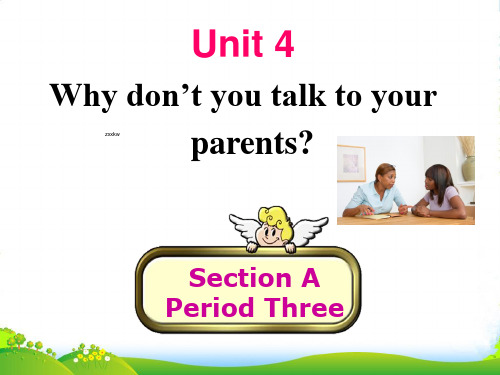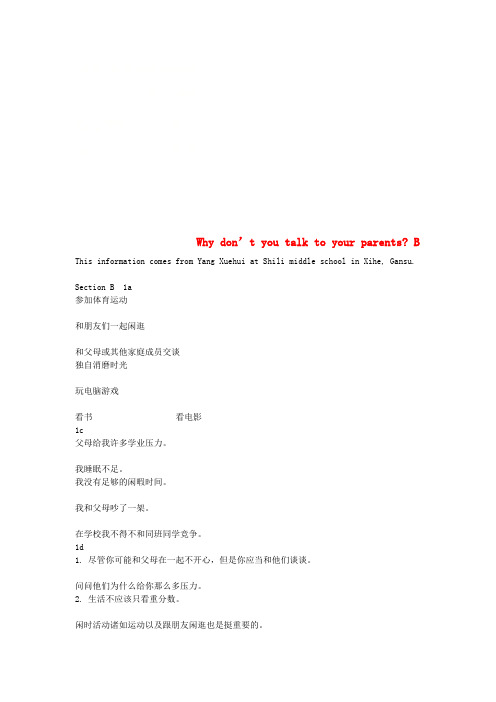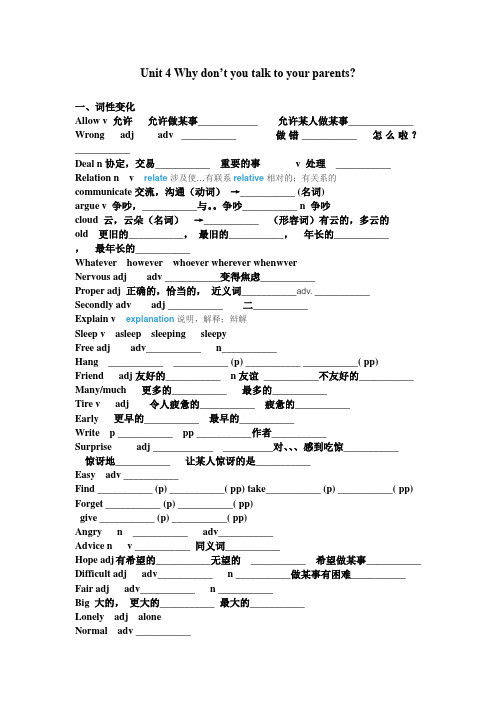201x年春八年级英语下册 Unit 4 Why don’t you talk to your pa
- 格式:ppt
- 大小:159.00 KB
- 文档页数:11

人教新目标八年级(下)Unit 4 Section B (the 1st period) 教学设计教材分析:本单元要求学生学会表达自己在学习、生活中遇到的问题或困惑,并且学会提出合理的建议。
为学生减负是我们国家近代教育之重任。
面对中学生目前的学习压力和过多的校外辅导班,学生一定有话要说,所以选题更接近学生生活实际。
加之八年级同学正处于叛逆期,正确引导他们应对遇到的困惑,帮助他们学会释放压力是本节课的教学重点之一,另一重点学会为同学或朋友提出有效建议。
教学设计中特别注重了德育渗透:学会释放压力,愉快的学习、生活。
一、教学目标1.知识目标:1)词汇:member pressure compete2) 词组:play sports spend time alone compete with..talk to family members hang out with friends2. 能力目标:1)能够用英语表达自己释放压力的方法。
2)能够听懂听力材料内容,可以针对问题给出有效建议。
3.情感态度价值目标:学会面对困难,积极地解决问题。
二、教学重难点重点:熟练掌握词汇、短语难点:听懂听力材料并能完成相应练习,能够用英语写出合理的建议。
三、教具:电子白板、PPT四、教学步骤Step 1 Review and lead-in (通过复习导入本节课话题,非常自然。
起到温故而知新的作用)1.ReviewT: In our daily life, we sometimes meet some problems or troubles at school or at home. In Section A, we learned how to express our problems and how to give advice. Do you often meet such problems? Let’s talk about them. (Then teacher ask some Ss to talk about their problems and ask other Ss to give advice according to each problem.)2.Lead-inT: Well class, when we meet these problems what should we do? (The teacher help the Ss to say) we should learn to face the problems and try to solve them. In Section B we’ll learn how to solve our problems.Step 2. (1a) Watching the video < 零压行动> (了解美国人减压方式,启发教育学生热爱生活,学会享受生活, 为完成1a 做铺垫。


2019-2020学年人教版英语八年级下册Unit 4 Why don’t you talk to your parents?课文知识点总结Section A1.Why don’t you talk to your parents? 你为什么不和你打父母谈谈呢?【解析】Why don't you do sth ?= Why not do sth? 为什么不......呢?【拓展】用于提建议的句型有:(1)What about doing sth ?=How about doing sth? ….怎么样?(2)Why don’t you do sth?= Why not do sth? 为什么不呢?(3)Let’s do sth.让我们一起做某事吧。
(4)Shall we/I do sth?我们做…好吗?(5)had better do/not do sth 最好做/不做某事(6) Will/Would you please do sth 请你做…好吗?(7) Would you like to do sth? 你想去做某事吗?(8)Would you mind doing sth?你介意做某事吗?【回答】(1). 同意对方的建议时,一般用:◆Good idea./ That’s good idea. 好主意◆OK/ All right./ Great 好/ 行/太好了◆Yes, please ./ I’d love to 是的/ 我愿意◆I agree with you 我同意你的看法◆No problem 没问题◆Sure/ Of course/ Certainly 当然可以◆Yes, I think so 对,我也这样想(2).对对方的帮助或要求表示委婉谢绝时,一般用:◆I don’t think so 我认为不是这样◆Sorry, I can’t 对不起,我不能◆I’d love to, but…◆I’m afraid…我愿意,但恐怕……2.I have to study too much so I don’t get enough sleep.我要学的太多,因此我睡眠不足。

Unit 4 Why don’t you talk to your parents?【重点单词】allow [əˈlaʊ] v. 允许,准许wrong [rɔŋ] adj. 错误的What's wrong? 哪儿不舒服?midnight ['mɪdnaɪt] n. 午夜,子夜look through 浏览,快速查看guess [ɡes] v. 猜测,估计deal [di:l] v. 处理,应付big deal 重要的事work out 成功地发展,解决get on with 和睦相处,关系良好relation [rɪˈleɪʃn] n. 关系,联系,交往communicate [kəˈmju:nikeit] v. 沟通,通信,通讯communication [kəˌmju:nɪˈkeɪʃn] n. 交流,沟通argue [ˈɑ:ɡju:] v. 争论,争吵cloud [klaʊd] n. 云elder ['eldə(r)] adj. 年级较长的instead [ɪnˈsted] adv. 代替whatever [wɒtˈevər] pron. 任何,不管什么,无论什么nervous [ˈnə:vəs] adj. 紧张不安的offer ['a:fər] v. 提供,自愿给予proper [ˈprɔpə] adj. 合适的,适当的secondly [ˈsekəndli] adv. 第二,其次explain [ɪkˈspleɪn] v. 讲解,解释,说明clear [klɪə] adj. 清晰的,清楚易懂的copy [ˈkɔpi] v. 复制return [rɪ'tɜ:n] v. 回来,返回,归还anymore ['enɪmɔ:] adv. 不再,再也不member [ˈmembə] n. 成员,会员pressure ['preʃə(r)] n. 压力compete [kəm'pi:t] v. 比赛,竞争opinion [əˈpɪnjən] n. 意见,想法,看法skill [skɪl] n. 技能,技巧typical [ˈtɪpɪkl] adj. 典型的football [ˈfʊtbɔ:l] n. 足球cut out 删去,删除quick [kwɪk] adj. 快的,迅速的continue [kənˈtɪnju:] v. 继续,连续compare [kəm'peə] v. 比较compare…with 比较,对比crazy [ˈkreɪzɪ] adj. 疯狂的,狂热的development [diˈveləpmənt] n. 发育,成长,发展cause [kɔ:z] n. & v. 原因;造成,使发生usual [ˈju:ʒuəl] adj. 通常的,平常的in one's opinion 依… 看perhaps [pəˈhæps] adv. 可能,大概,也许【重点语法】在英语中,表示建议的说法有很多,而且都是中考考查的重点。

Why don’t you talk to your parents? B This information comes from Yang Xuehui at Shili middle school in Xihe, Gansu.Section B 1a参加体育运动和朋友们一起闲逛和父母或其他家庭成员交谈独自消磨时光玩电脑游戏看书看电影1c父母给我许多学业压力。
我睡眠不足。
我没有足够的闲暇时间。
我和父母吵了一架。
在学校我不得不和同班同学竞争。
1d1. 尽管你可能和父母在一起不开心,但是你应当和他们谈谈。
问问他们为什么给你那么多压力。
2. 生活不应该只看重分数。
闲时活动诸如运动以及跟朋友闲逛也是挺重要的。
3. 你不应该为了取得较好成绩跟同学较劲。
你们都应该互相帮助共同提高。
2b或许你应该学会放松!如今,中国孩子有时周末比上学日还要忙,因为他们不得不上那么多的课外班。
他们中许多人在学习考试技巧以便他们能进入一所好的高中再后来可以上一所好大学。
另外一些人在参加体育训练以便他们能在比赛中获胜。
然而,这不仅仅发生在中国。
泰勒一家是一个典型的美国家庭。
对于凯茜•泰勒的三个孩子来说,生活是忙碌的。
“在大多数日子的放学后”,凯茜说:“我把两个儿子中的一个带去练篮球,女儿去训练足球。
然后我还得送另一个儿子去上钢琴课。
或许我可以减少一些他们的活动,但我相信这些活动对我孩子的将来是很重要的。
我真希望他们将来成功。
”然而,疲劳不堪的孩子们直到晚上7点才回到家。
他们匆匆忙忙吃完饭,接着就该做作业了。
琳达•米勒,一位有三个孩子的母亲,清楚这一切的压力。
“在有些家庭里,竞争从很小就开始了,一直持续到孩子长大成人。
妈妈们把自己的孩子送到各种各样的学习班。
她们老是拿自己的孩子和别人家的孩子对比。
这简直是疯了。
我觉得这不公平。
他们为什么不能让孩子做回孩子呢?人们不应该把孩子逼得那么紧。
“医生说太多的压力对孩子们的发展是有害无益。


Step 5:Listening活动一、出示听力图片引导学生猜测“Is she happy? What ’s wrong with the girl?” 播放录音 并根据学生完成听力情况调整听力次数 看图片做听力猜测,读1a 句子做好听力准备,核对答案。
活动二、fill in the blanks再次听力,补全朋友给出的建议。
重视听力策略的训练 活动二的设计一方面是根据学生的水平对听力材料难度进行的调整,另一方面也是为了让学生继续感知问题与建议这一话题。
Step 6:Group work If your classmates have some troubles, can you giv e them some advice? Try to give advice in groups. 并进行总结给出建议的几种方式。
小组合作讨论问题并给出恰当的建议,利用小组的作用,调动学生的积极性。
Step 7 :pair work T : There is something wrong with me . can you give me advice?T: Now it ’s your turn. Work in pairs to makea new conversation从师生对话过渡到生生对话,进行目标语言的操练。
Step8: ListeningShow the picture lead in the listening 2a 、2b Look at the picture and guess “What ’s the matter with Peter?”Read the advice that Peter ’s friend gives himand the reason why Peter doesn ’t like theadviceDo listening and Check the answers.通过导入听前活动,做好听力准备,进行听力训练。


单元过关与检测(Unit 4)(时间:120分钟满分:120分)一、听力(20分)Ⅰ.听句子,选择正确的图片(其中有两项多余)。
句子读两遍。
(5分)1. B2. F3. G4. A5. DⅡ.听小对话,选择最佳答案。
对话读两遍。
(5分)( A )6.What’s the matter with Lisa?A.She argued with her mother.B.She was ill.C.She was stressed out.( B )7.What should the man do?A.He should borrow money from others.B.He should get a part-time job.C.He can ask his parents for some money.( B )8.What’s happening to the woman?A.She is asking the policeman for help.B.She gets lost.C.She is giving directions to the man.( B )9.Why is the man angry?A.He can’t listen to his CDs.B.His sister plays her CDs too loud.C.He has a fight with his sister.( C )10.What will the man do?A.He will write Eve a letter.B.He will go to Eve’s home.C.He will talk with Eve on the phone.Ⅲ.听长对话,选择最佳答案。
对话读两遍。
(5分)听第一段对话,完成第11—12小题。
( B )11.Who got the worst grade in English?A.Jane.B.Jim.C.Frank.( B )12.What does Jane advise Jim to do?A.Jim shouldn’t call up his best friend.B.Jim should study harder.C.Jim should write to his best friend.听第二段对话,完成第13—15小题。

课题课时Period 1教学目标语言技能听:能听懂他人他人陈述困难和麻烦的简单对话的内容,并获取主要信息。
说:1.能询问、陈述自己或他人的困难和麻烦,如What’s wrong?I’m really tired because I studied until midnight last night.2.能针对别人的困境提出解决的办法和建议,如What should Ido?Well,you should call him so that you can say you’re sorry.语言知识语音:熟练把握邀请句的升调语调,同时,在口语交流时能做到语音、语调准确、自然、流畅。
词汇:1.熟练运用:allow,wrong,midnight,guess,de al.2.掌握:What’s wrong, look through,work out.语法:1.能正确使用情态动词could,should表达或劝告,如:Youcould go to his house.2.能正确使用Why don’t you...?句型表达建议。
功能:学会询问、陈述自己或他人的困难和麻烦。
话题:了解人际交往的相关知识。
情感态度1.培养学生用英语交际能力,学会与人进行流畅的沟通和交流;2.使学生在活动中学会真诚、坦然地与人交谈。
学习策略认知策略:能在具体的情境中询问、陈述自己或他人的困难和麻烦,从而进一步主动练习和实践。
调控策略:.能针对别人的困境提出解决的办法和建议,并与人进行交流。
交际策略:培养学生合作能力,不断完善知识点,加强对话练习,学会与人闲聊,进行交流。
资源策略:通过多媒体、录音机等教学辅助工具。
文化意识了解中西方家长对待孩子参加课外活动和课外学习班的态度与做法。
教学重难点教学重点1.能正确使用情态动词could,should表达或劝告。
2.能正确使用Why don’t you...?句型表达建议。
教学难点1.Talk about problems.2.Give advice.教学方法听说法,交际法,教学辅助手段PPT, recorder.板书设计Unit4 Why don’t you talk to your parents?Sectio n A 1a-2dallow What’s wrong?wrong Why don’t you...?midnightguessdeal教后反思本节课学会了提建议的方式有:Why don’t you...? /Why not…?等Teaching ProcedureStages/TimingStep 1. warming-upStep 2 PresentationStep3 DiscussionStep 4Pre sentationStep 5 ListeningTeach ers’ a ctivitiesAfter greeting, ask students :What day is it today?What’s the date today?What’s the weather like today?1. Show the picture of a girl:T: Please look at this girl,what isshe doing?T: Look at her face,she isworried.because she has a lotof homework to do.Do yo uhave too much homework todo?Do you think it is serious?1a.Get them to read the followingsentences and discuss wheatherthey are serious or not. And thenwrite them in the approprite boxT:Do you have theseproblems?What kind of problemsdo you have?Students’ activitiesStudents answer the questions。

Unit 4 Why don’t you talk to your parents? 说课稿一、教材分析(一)教材的地位和作用本课的中心话题是谈论同学们生活及学习中的问题和困难并提出合适的建议,从而展开教学活动。
学习本课的内容为整个单元打下基础,同时也是英语教学中拓展学生思维的重要环节。
(二)教学目标的确立和依据根据《新课程标准》的要求,为了完成正常的教学任务,有效地培养学生的自信,创新精神和合作互助的能力,我确立如下的教学目标:1、语言知识:学生能够使用以下词汇:too much, enough, allow, hang out, fight,wrong, midnight.句型:----What’s wrong?----I have to study too much so I don’t get enough sleep. ----Why don’t you talk to your parents?2、语言技能:(1)学完本课,让学生学会用英语说出学习和生活中的问题和困难,并能根据别人的问题给出合适的建议。
(2)能运用所学单词、短语及句型,结合实际生活进行灵活运用。
3、学习策略:(1)自主学习:要求学生采用自主学习的方式,能根据需要进行有目的的预习。
(2)合作学习:在活动中相互探讨,相互交流与合作,从而获得知识、技能和情感体验。
4、情感态度:(1)通过说出自己学习和生活中的问题和困难,让同学们学会释放压力,增加自信,热爱生活。
(2)通过给别人提建议,培养学生团结互助的精神,增进同学之间的感情。
5、文化意识:(1)了解中西方文化差异:我们比较委婉,而西方人则更直接一些,对学生进行不同文化意识的渗透。
(三)教学重点和难点:1.重点:让学生用英语说出学习和生活中的问题和困难,并且给出别人一些合适的建议,注意提建议的句型及用法和建议形式的多样化。
2.难点:用英语给出合适的建议是一大难点,词汇和短语搭配等基本功要扎实。

八年级英语下册Unit 4 Why don’t you talk to your parents Section B(第3课时)说课稿一. 教材分析《八年级英语下册》Unit 4 Why don’t you talk to your parents Section B(第3课时)主要讲述了孩子们如何与父母沟通,寻求解决问题的方法。
本节课的主要内容包括一个对话和一个任务型阅读理解。
通过本节课的学习,学生能够掌握日常交际用语,提高听说能力,并能运用所学知识解决实际问题。
二. 学情分析八年级的学生已经具备了一定的英语基础,对于日常交际用语有一定的了解。
但是,学生在实际运用英语进行沟通时,仍存在一定的困难。
此外,部分学生可能还存在与父母沟通困难的问题。
因此,在教学过程中,教师需要关注学生的英语实际运用能力,以及帮助他们掌握与父母沟通的技巧。
三. 说教学目标1.知识目标:学生能够掌握本节课的单词、短语和日常交际用语;2.能力目标:学生能够听懂、会说、会读本节课的主要内容,提高英语听说能力;3.情感目标:学生能够学会与父母沟通,增进彼此的了解,建立良好的亲子关系。
四. 说教学重难点1.教学重点:单词、短语和日常交际用语的掌握;2.教学难点:如何运用所学知识解决实际问题,提高学生的英语实际运用能力。
五. 说教学方法与手段本节课采用任务型教学法,结合情境教学法,以学生为主体,教师为主导。
通过听说、读写、小组讨论等多种教学活动,激发学生的学习兴趣,提高学生的英语实际运用能力。
六. 说教学过程1.热身(5分钟):教师与学生进行简单的英语交流,询问学生上一节课的学习情况,引导学生进入英语学习氛围。
2.呈现(10分钟):教师通过图片、情境等方式,展示本节课的主要内容,引导学生学习单词、短语和日常交际用语。
3.操练(15分钟):教师学生进行听力练习、口语练习、角色扮演等,让学生在实际语境中运用所学知识。
4.任务型阅读理解(10分钟):教师引导学生阅读文本,回答相关问题,提高学生的阅读理解能力。

2019-2020学年人教版英语八年级下册Unit 4 Why don’t you talk to your parents?课文知识点总结Section A1.Why don’t you talk to your parents? 你为什么不和你打父母谈谈呢?【解析】Why don't you do sth ?= Why not do sth? 为什么不......呢?【拓展】用于提建议的句型有:(1)What about doing sth ?=How about doing sth? ….怎么样?(2)Why don’t you do sth?= Why not do sth? 为什么不呢?(3)Let’s do sth.让我们一起做某事吧。
(4)Shall we/I do sth?我们做…好吗?(5)had better do/not do sth 最好做/不做某事(6) Will/Would you please do sth 请你做…好吗?(7) Would you like to do sth? 你想去做某事吗?(8)Would you mind doing sth?你介意做某事吗?【回答】(1). 同意对方的建议时,一般用:◆Good idea./ That’s good idea. 好主意◆OK/ All right./ Great 好/ 行/太好了◆Yes, please ./ I’d love to 是的/ 我愿意◆I agree with you 我同意你的看法◆No problem 没问题◆Sure/ Of course/ Certainly 当然可以◆Yes, I think so 对,我也这样想(2).对对方的帮助或要求表示委婉谢绝时,一般用:◆I don’t think so 我认为不是这样◆Sorry, I can’t 对不起,我不能◆I’d love to, but…◆I’m afraid…我愿意,但恐怕……2.I have to study too much so I don’t get enough sleep.我要学的太多,因此我睡眠不足。

UNIT4 练习题附详细参考答案1. Jimmy didn’t do his homework. I, he played computer games, so his parents were very angry.2. —What r is Bill to you?—He is my uncle.3. He had no way to c with his brother.4. Look! There are many c in the sky. It seems to rain.5. Could you e the new words for me? I can’t understand them.1. Mary’s mother allows her(choose)her clothes.2. Why don’t you(go)to the movies with me?3.The teacher found the little girl_________(argue) with an old man in the street.4. Little Jimmy went to bed without(have)dinner last night.5. (look)through others’things is not polite.1. Please tell them football in the street. It’s dangerous.A. not playB. don’t playC. not to playD. can’t play2. The little boy saved every coin he could buy his mother a present on Mother’s Day.A. so. . . that. . .B. such thatC. in order toD. so that3. —Oh, my god! I really don’t know next. —What’s wrong? Can I help you?A. what to do itB. how do itC. how to doD. what to do4. These wild flowers are so special, I would do I can to save them. A. whatever B. that C. which D. whichever5. —Do you mind me your computer?—Not at all. A. use B. using C. to use D. used1. 昨天晚上我爸爸直到11点才回家。

Unit 4 Why don’t you talk to your parents?Period 1 Section A(1a-2d)必背单词1. allow (v.) 允许;准许→ allow sb. to do sth. 允许某人做某事2. wrong (adj.) 有毛病;错误的3. guess (v.) 猜测→ I guess 我想……4. deal (n.) 协议;交易必背短语5. look through 浏览6. big deal 重要的事7. work out 成功地发展必背句子8. —What’s wrong?怎么了?— I’m really tired because I studied until midnight last night.我真的很累,因为昨晚我学习到半夜。
9. I found my sister looking through my things yesterday.昨天我发现我的妹妹在快速查看我的东西。
10. —What should I do? 我应该怎么办?—Why don’t you forget about it? Although she’s wrong, it’s not a big deal.你为什么不忘记它呢?尽管她做得不对,但也没什么了不起的。
Period 2 Section A(3a-3c)必背单词1. relation (n.) 关系;联系;交往→ relate (v.) 关联2. communication (n.) 交流;沟通→ communicate (v.)交流3. argue (v.) 争论;争吵→ argument (n.) 争论4. cloud (n.) 云;云朵→ cloudy (adj.) 多云的5. elder (adj.) 年纪较长的→ older (adj.) 年纪较长的6. instead (adv.) 代替;反而;却→ instead of 代替7. whatever (pron.) 任何;每一8. nervous (adj.) 焦虑的;担忧的9. offer (v.) 主动提出;自愿给予→ offer to do sth.主动提出做某事10. proper (adj.) 正确的;恰当的→ properly (adv.)正确地;恰当地11. secondly (adv.) 其次;第二→ firstly (adv.) 首先;第一12. communicate (v.) 交流→ communication (n.) 交流13. explain (v.) 解释;说明→ explanation (n.) 解释;说明14. clear (adj.) 清楚易懂的;晴朗的→ clearly (adv.)清楚易懂地;晴朗地必背短语15. get on with 和睦相处,关系良好必背句子16. Instead he watches whatever he wants until late at night.相反,他看他想看的,一直到深夜。

Unit 4 Why don’t you talk to your parents?一、词性变化Allow v 允许允许做某事____________ 允许某人做某事_____________ Wrong adj adv ___________ 做错___________ 怎么啦?___________Deal n协定,交易___________ 重要的事v 处理___________ Relation n v relate 涉及使…有联系relative 相对的;有关系的communicate交流,沟通(动词)→___________ (名词)argue v 争吵,___________与。
争吵___________ n 争吵cloud 云,云朵(名词)→___________ (形容词)有云的,多云的old 更旧的___________,最旧的___________,年长的___________,最年长的___________Whatever however whoever wherever whenwverNervous adj adv ___________变得焦虑___________Proper adj 正确的,恰当的,近义词___________adv. ___________Secondly adv adj ___________ 二___________Explain v explanation 说明,解释;辩解Sleep v asleep sleeping sleepyFree adj adv___________ n___________Hang ___________ ___________ (p) ___________ ___________( pp)Friend adj友好的___________ n友谊___________不友好的___________ Many/much 更多的___________ 最多的___________Tire v adj 令人疲惫的___________ 疲惫的___________Early 更早的___________ 最早的___________Write p ___________ pp ___________作者___________Surprise adj ____________ __________对、、、感到吃惊___________惊讶地___________ 让某人惊讶的是___________Easy adv ___________Find ___________ (p) ___________( pp) take___________ (p) ___________( pp) Forget ___________ (p) ___________( pp)give ___________ (p) ___________( pp)Angry n ___________ adv___________Advice n v ___________ 同义词___________Hope adj有希望的___________无望的___________ 希望做某事___________ Difficult adj adv___________ n ___________做某事有困难___________ Fair adj adv___________ n ___________Big 大的,更大的___________ 最大的___________Lonely adj aloneNormal adv ___________二、重点短语1. why don’t you + 动词原形+ …? = why not + + 动词原形+ …? 为什么不…?2. ___________ 允许某人做某事___________允许做某事3. ___________ 与某人闲逛4. ___________课外辅导班5. ___________. = have a fight with sb与某人吵架/打架6. ___________直到半夜7. ___________. 与某人交谈(单方面的说话) ___________和某人交谈(双方的谈话)8. ___________有空闲时间9. ___________学得过多10. ___________有足够的睡眠11. ___________给某人写信12. ___________打电话给某人13. ___________ 令某人惊讶14. ___________翻看,浏览相当于___________谈论关于…15. ___________ 生某人的气thank sb for +名词/代词/动名词16. ___________重要的事17. ___________成功地发展;解决, 改善18. ___________ 和睦相处;关系良好19. ___________经常吵架/打架20. ___________+ 名词/代词/动名词“擅长于...” ___________对…有好处21. ___________ 拒绝做某事22. ___________ 主动提出做某事= offer sth to sb给某人提供某物23. ___________以便,为了= ___________ (后都跟从句,且从句经常用can,could等情态动词)24. ___________ 介意做某事___________ 介意某人做某事25. without +名词/代词/动名词“在没有…的情况下26 ___________ 与……比较27. ___________使某人生气28. ___________ 担心某事29. ___________抄袭某人的作业30. ___________做自己三重点词法1.Why don’t you talk to your parents? 你为什么不和你打父母谈谈呢?【解析】Why don't you do sth ?= Why not do sth? 为什么不......呢?【拓展】用于提建议的句型有:(1) ___________ ….怎么样?(2) ___________?= Why not do sth? 为什么不呢?(3) ___________.让我们一起做某事吧。

八年级英语下册Unit4Whydon’tyoutalktoyourparents?知识点整理八年级英语下册Unit4hydon’tyoutaltoyourparents?知识点整理hydon’tyoutaltoyourparents?你为什么不和你打父母谈谈呢?【解析】hydon'tyoudosth?=hynotdosth?为什么不......呢?【拓展】用于提建议的句型有:hataboutdoingsth?=Hoaboutdoingsth?….怎么样?hydon’tyoudosth?=hynotdosth?为什么不呢?Let’sdosth.让我们一起做某事吧。
Shalle/Idosth?我们做…好吗?hadbetterdo/notdosth最好做/不做某事ill/ouldyoupleasedosth请你做…好吗?ouldyoulietodosth?你想去做某事吗?ouldyouinddoingsth?你介意做某事吗?【回答】同意对方的建议时,一般用:◆Goodidea./That’sgoodidea.好主意◆o/Allright./Great好/行/太好了◆yes,please./I’dloveto是的/我愿意◆Iagreeithyou我同意你的看法◆Noproble没问题◆Sure/ofcourse/certainly当然可以◆yes,Ithinso对,我也这样想对对方的帮助或要求表示委婉谢绝时,一般用:◆Idon’tthinso我认为不是这样◆Sorry,Ican’t对不起,我不能◆I’dloveto,but…◆I’afraid…我愿意,但恐怕……【XX天津4】35.—hynotgotoLaoSheTeahousetonight?—______.A.Itdoesn'tatterB.Thanyouc.SorrytohearthatD.Soundsg reat【XX广东广州4】25.—Ifeelreallytired.—______A.Lucyyou!B.you’dbetterorharder.c.congratulations!D.hynotgoandhavea rest?【XX四川凉山3】37.—It’saniceday,isn’tit?—yes.______goinghiingandrelaxourselves?A.hynotB.hydon’tc.hatabout【XX湖南益阳】youlootootired.hynot_____arest?A.StoptohaveB.tostop havingc.stophavingIhavetostudytoouchsoIdon’tgetenoughsleep.我要学的太多,因此我睡眠不足。